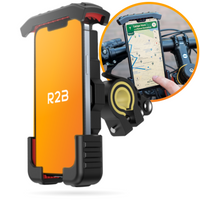No Products in the Cart

Can you take your laptop in hand luggage on a plane?
Time to read 4 min
Time to read 4 min
Traveling with a laptop is common these days, whether for business or personal use. But before you pack your laptop for your next flight, it's important to know whether you can take it in your hand luggage. The rules and regulations regarding electronic devices, including laptops, may vary from airline to airline and country to country. In this explanation, we will discuss the general guidelines regarding carrying a laptop in your carry-on luggage, as well as some important points to consider.
In general, you are allowed to take your laptop with you in your hand luggage during a flight. Most airlines allow laptops as part of your carry-on luggage. However, it is always wise to check the specific rules and regulations of the airline you are flying with as they may vary.
Here are some important points to pay attention to:
Size and weight : Check the maximum dimensions and weight limit for carry-on luggage set by the airline. Make sure your laptop falls within these limits.
Security Check : At the airport security check, you will need to take your laptop out of your bag and place it separately on the conveyor belt, similar to other electronic devices. Make sure you have easy access to your laptop so you can quickly remove it and pack it back up.
Protecting your laptop : Use a sturdy laptop bag or sleeve to protect your laptop from shocks and bumps while traveling. Also consider using a case that is easy to open so you can quickly remove your laptop from the bag during security checks.
Battery regulations : Make sure you are aware of the airline's regulations regarding carrying spare batteries or power banks. Some airlines have specific rules for transporting lithium batteries, so make sure you follow these regulations.
In general, it is not recommended to take your laptop with you in your checked luggage during a flight. While it is technically possible to fit your laptop in your checked luggage, there are some important considerations to keep in mind:
Protection : Checked baggage can be rough handled during transport, potentially causing severe shock and impact. This can cause damage to your laptop. Laptops are sensitive electronic devices and it is important to properly protect them from physical damage.
Risk of theft : Although airports usually have security measures to protect luggage, there is still a risk of theft. Laptops are valuable and attractive targets for thieves. It is safer to keep your laptop with you in your carry-on luggage, where you can constantly monitor it.
Data security : If you have confidential or sensitive data on your laptop, it can be risky to put it in your checked luggage. There is always a small risk that your luggage will be lost or delayed. It is wiser to keep your laptop with you so that you maintain control over your data.
To be well prepared for a plane trip, there are several important steps you can follow. Here are some tips to help you:
1. Documents and travel documentation:
Your bags can take a few hits during your trip. This could easily mean the end for your electronic items that you want to take with you during your trip. To be extra well prepared for your trip, it is therefore strongly recommended to protect your belongings. R2B offers laptop bags with which you can properly protect your laptop or tablet during your trip! Press here for the range of laptop bags from R2B.
Yes, many airlines now offer Wi-Fi services on board their planes. WiFi on the plane allows passengers to stay connected to the internet during the flight. It allows you to check emails, surf the web, update social media, send and receive messages, and in some cases even use streaming services.
The provision of WiFi on the plane may vary between airlines and depend on the type of aircraft and flight route. Some airlines offer free Wi-Fi on certain planes or for specific classes of travel, while others may charge for Wi-Fi use or offer different Wi-Fi packages to choose from.
It is important to note that the availability and reliability of in-flight WiFi may vary. During certain phases of the flight, such as takeoff and landing, Wi-Fi service may be temporarily disabled. In addition, the speed of the connection may be limited due to the limited bandwidth on board.
